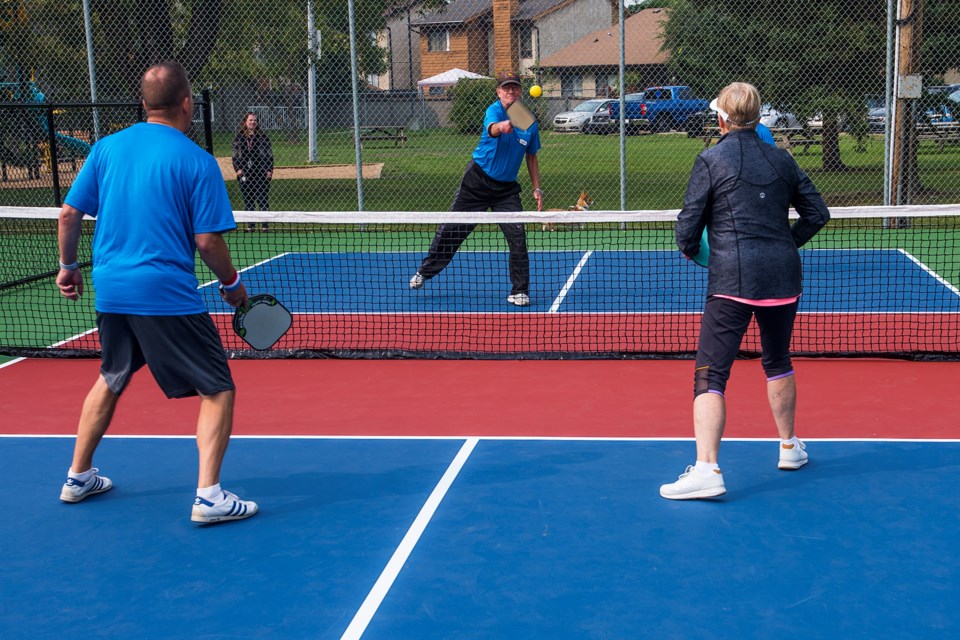After hearing passionate pleas from nearby residents, St. Albert city council has voted to install sound barriers at the Alpine Park pickleball courts using $98,000 remaining in provincial grants for the project.
On Dec. 1, Coun. Sheena Hughes brought back the project during budget deliberations for the 2021 budget. It's not about how many noise complaints the city gets, Hughes said – it's about the fact the city put a "high-intensity court in a residential neighbourhood" without sound barriers.
"Other communities that do build them anywhere near residential neighbourhoods put the sound barriers up as a standard," Hughes said. "There was really a lack of awareness about the impact of how pickleball noise is different than many other sports."
In 2018, the tennis courts at Alpine Park were converted into 12 pickleball courts, which included interior fencing, court surfacing, benches and garbage cans, but no sound barriers. After hearing from residents about the noise, administration found a flexible acoustic sound barrier that hangs on a fence to reduce the noise by about 50 per cent, said Diane Enger, director of recreation and parks.
In April, council voted down a recommendation from the city's community living standing committee to spend the rest of the grant money to install acoustic panels around the 12-court area, citing financial constraints from the COVID-19 pandemic. In addition to installation, there would be annual costs of about $2,400 for seasonal storage of the panels.
Travis Parayko describes the sound of a wiffle ball smacking against a panel like "taking a golf ball and pounding on the bottom of a frying pan." Now imagine that sound multiplied tenfold, mixed in with sounds of cheering and chatter, all day long.
"It's just a constant noise," Parayko said, who can see the pickleball courts from his backyard in Akinsdale. "If you had a window open to get some fresh air, you start hearing someone play at 7:30 in the morning. And they could go on till 10:00 at night. So I mean, you try to live with that."
Parakyo and his neighbours were at the centre of a debate at city hall on Dec. 1. The three neighbours pleaded for council to support a budget motion to install a sound barrier to tone down the noise, a project they feel should have been completed from the start.
Matthias Brenholen and his family live about 25 feet from the pickleball courts, outdoor ice rink, baseball diamond and sport fields.
He said his family is used to the sounds of hockey – a puck bouncing off the boards, or skates cutting into a fresh sheet of ice. They've also never complained about whistles from the soccer field, or the crack of a baseball bat, he said. But the noise from pickleball is different.
"The noise generated from the game is louder, sharper and at a higher pitch. It makes you cringe when you hear it. You become so sensitive to it, it wrecks your whole day," Brenholen told council. "These courts should not have been built 25 feet from a local residence."
He said several studies have documented the effects of pickleball in residential neighbourhoods, and all the results have a common theme: do not build in residential neighbourhoods, and if you do, install acoustic panelling.
"(Studies) show the readings of pickleball range from 64 to 81 decibels. This exceeds our noise bylaw," he said.
Wylie Simmonds also gave an emotional address to council to let them know how the noise has affected his household.
"There was no consultation with the neighbours. There was no research done into the problems pickleball noise can have on a neighbourhood," he said, noting he complained about the noise years ago. "It shows a real lack of empathy for the citizens of Akinsdale ... it's time to complete what you've dropped on our lives."
Coun. Ray Watkins questioned if residents would be satisfied with a 50-per-cent reduction, and proposed the city use the money to do a $30,000 sound study instead.
Hughes said the residents tolerated the other noises around them, but recognized pickleball noise as different.
"It's an entirely different level of noise. Should the dripping noise be annoying? Sure. But if it's annoying and loud, it becomes overwhelming. Reducing it by 50 per cent makes it much easier, much more muted."
The motion passed in a 5-2 vote, with councillors Watkins and Natalie Joly against.
Pending final approval of the 2021 budget this month, the sound barrier will be installed next year. The exact dates will be confirmed once the project is tendered, according to the city.




